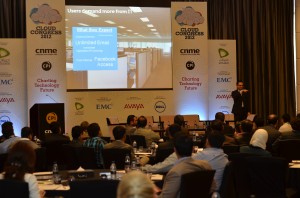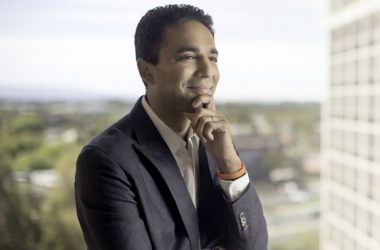CNME held its annual Cloud Congress in Dubai, rallying together users and providers to discuss the best practices and technologies to manage cloud
The Congress delivered an insightful and thought provoking set of talks and discussions from IT leaders and managers from around the region who were keen to go in-depth about the main theme; traditional IT crumbling under the weight of cloud computing.
Bilal El Sabbagh, Director of Consulting, Deloitte & Touche, opened proceedings, discussing the journey into cloud for enterprises who, he claimed, were still “fearful” of adopting the system.
“The market for enterprise cloud is growing fast,” he said. “But why would people adopt cloud if they did not know the risks and how to manage the risks?”
The concern for many end users was that the virtualisation and cloud solutions would diminish traditional IT. El Sabbagh said that IT’s definition has changed, and customers need to evolve and adjust in order to maintain relevance with the expanding trend.
“In the cloud, the new IT organisation role will shift towards a service-oriented customer focus role that helps to align the business needs with the vendor solutions. The IT emphasis will be on integrating services across multiple providers. Thus, cloud will affect many of the traditional IT capabilities like support, backup and analytics.”
“It is a risky decision to move to the cloud without having the proper controls in place. Especially if you are moving your data and services cross-border. Differences in legislation must be taken into consideration and even time-zones when it comes to SLAs,” he added.
Following questions focused on the concerns of diminishing services and outdated services becoming obsolete, El Sabbagh concluded and Dell Enterprise Product Manager, Basil Ayass took to the stage to support the fearful, claiming that he was also afraid of the cloud.
“Bilal showed us 60 slides of how IT will diminish once it moves into the cloud, but what about us? What about our jobs?” stated Ayass.
“When I was younger, I wondered what I would become. A doctor, perhaps? A lawyer? At the time the emerging need and demand was computer science and information technology, so I took it up. Now things are changing again, with cloud we’re fighting for our roles.”
The key concern in Ayass’ argument was that IT is losing its need and that traditional IT personnel aren’t prepared to serve the upcoming generation with what they want.
“The younger generation wants YouTube, Facebook, tablets, smartphones and bandwidth faster and faster, and we are offering them a laptop and Windows XP? We’re losing our importance.”
“We as a company realised that we needed to change in order to survive. If you don’t evolve with emerging trends your business will suffer, not just your IT. Your customers won’t be happy and you won’t be able to compete,” Ayass warns.
Ayass also argued that cloud brings with it severe security risks. Having your data spread around, being accessed from different devices and areas increases the dangers of being attacked.
“Take the Al Jazeera Twitter attack for example. It took Jazeera 16 hours to get back online following their attack, which involved someone sending out fake tweets about sensitive stories. I won’t trust their news service any longer, I would check with another news service now because how would I know what was real or fake? This is all because of the vulnerability of the service they were providing,” he said.
Ramesh Bhandari, Cloud Computing Manager of Etisalat, presented the importance of forging the right relationships for cloud, while Feras Zeidan, Networking Channel Manager, Avaya, discussed cloud enabled network architecture, touching on the impact of social media. He put forward some insightful facts in regards to the acceleration of adoption of modern applications.
“Social media is not a fad, it’s a fundamental shift in the way we communicate,” he said.
Offering an end-user’s perspective, Alok Srivastava, Acting Head of IT, Masdar, discussed data centre optimisation and consolidation, which was followed by a unique panel discussion in which end users and vendors spoke about the implementation of a cloud solution at Higher College of Technology.
The college has recently invested in a Huawei desktop cloud platform to assist teachers and students by enabling them to access their work, lectures, presentations and updates from any device, in any place from one central storage facility.
The discussion included Amit Mathur, Huawei Enterprise Cloud Solutions Expert, HCT Professor, Mohammed Arif Amin and HCT student and user of the solution, Mubarak Omar Mubarak Al Jabri. The panel presented a rare insight into a solution which had been purchased, implemented and tested.
HCT Professor, Mohammed Arif Amin said: “When students first came to the school they were supplied a laptop, by their last year the laptop was already obsolete, we encouraged them to buy a new device, but not all students would do that. Now they can purchase whichever device they choose and bring them into study and connect them under our infrastructure. With contracts they can always upgrade when necessary, it eliminates all worries.”
He added that the students feel comfortable with the Huawei box in different locations and feel like it’s their own. “They can locate work from the box, complete assignments and replace them back into the box. The professors can then collect the work from the box from any place in the world, mark them and set them back down into the box. Everyone feels safe and happy with that,” he concluded.






